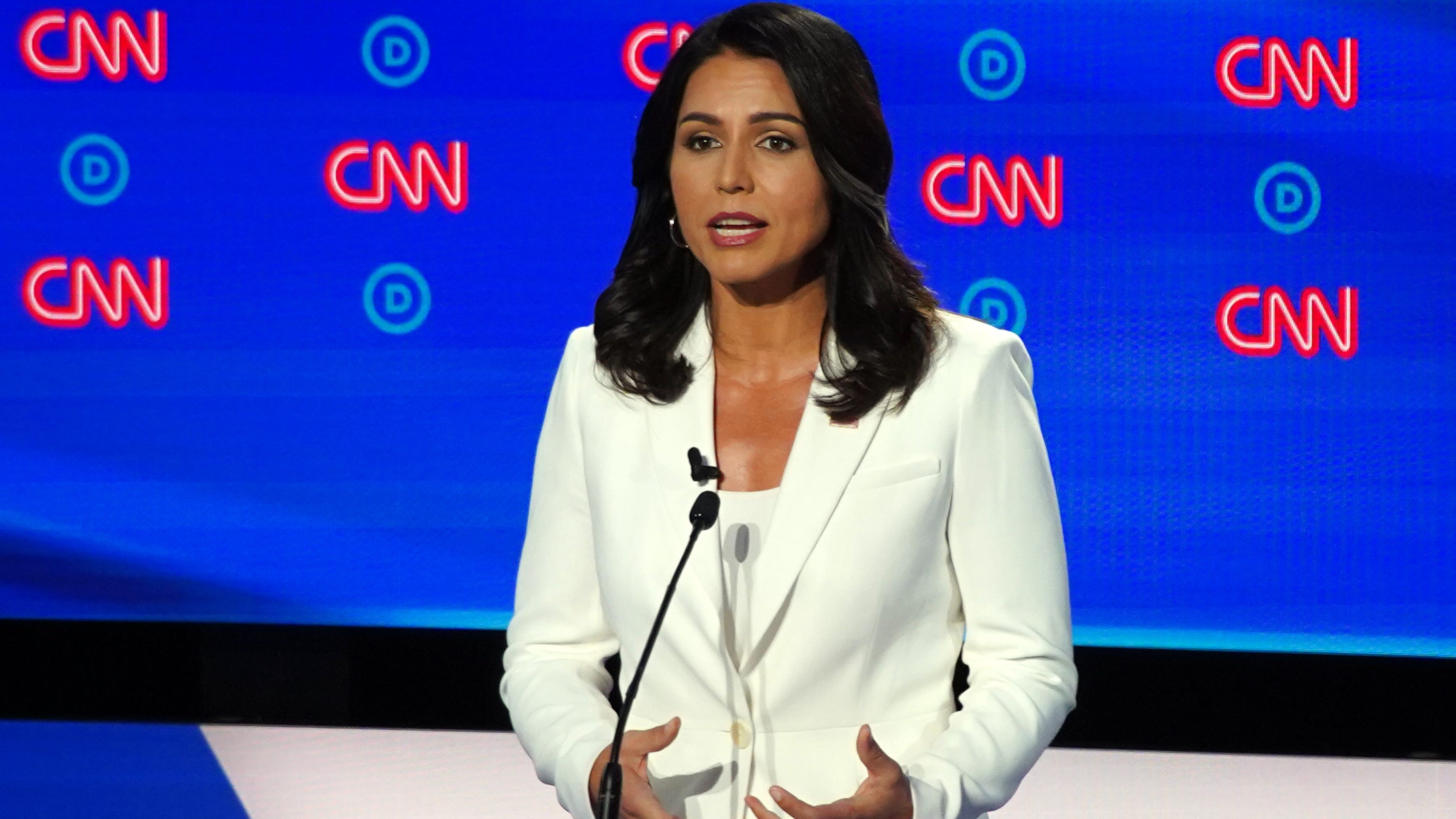Despite having qualified for the Oct. 15 Democratic debate at the last minute with positive poll numbers, Hawaii Rep. Tulsi Gabbard is now threatening to boycott the next debate due to claims that the Democratic National Committee (DNC) is trying to rig the 2020 Democratic primary.
Gabbard released a short video to supporters arguing that the DNC is basing debate participation criteria on polls and other factors which, Gabbard claims, do not represent a very democratic or transparent way of letting the voters decide:
I am seriously considering boycotting October 15 debate to bring attention to DNC/corporate media’s effort to rig 2020 primary. Not against Bernie this time, but against voters in early states Iowa, New Hampshire, South… –> https://t.co/x5P3GFGbyn pic.twitter.com/UgKCj6DGI0
— Tulsi Gabbard ? (@TulsiGabbard) October 10, 2019
In the video posted to Gabbard’s twitter feed on Thursday, Gabbard claims that the 2016 Democratic primary was “rigged against Bernie Sanders,” and the DNC is doing the same thing in 2020, but this time “against the American people.”
Gabbard’s basic argument is that the debate criteria, along with a push to elevate candidates in the media based on their poll numbers, are creating a pre-primary primary where the field gets narrowed before voters ever have a chance to make a decision. In some ways, she’s correct, but in other ways, this primary is no different than any other past presidential primary.
The 2016 Democratic primary was a blatant example of favoritism toward Hillary Clinton by the DNC against all other candidates, Bernie included. The late and shortened debate schedule in 2015, which didn’t see the first Democratic debate until October, was created purely to protect Hillary from any real competition.
For the 2020 Democratic primary, DNC Chairman Tom Perez appears to have gone out of his way to make the debates more plentiful, and more open to as many candidates as possible. Allowing 20 candidates to debate in June and July spread over two nights seems generous considering that only about a handful out of that number had a real shot at the nomination.
Gabbard goes on to criticize the debate broadcasts themselves as “commercialized reality television, meant to entertain rather than to inform or enlighten.” I don’t think many viewers, or candidates, would argue with that assessment.
In fact, Gabbard isn’t the first 2020 candidate to compare the debates to reality television. That person was Bernie Sanders, which we reported on back in August:
“You shouldn’t even call them a debate. What they are is a reality TV show in which you have to come up with a soundbite and all that stuff.
“It’s demeaning to the candidates and it’s demeaning to the American people. You can’t explain the complexity of health care in America in 45 seconds, nobody can.”
The Vermont senator got candid while responding to a question on whether he got frustrated by the time constraints placed on candidates during the debates.
What is Tulsi Gabbard’s end game with this? Let’s get one thing clear: There’s no way that Gabbard will skip the next debate. She’s making an issue to get attention right now, and maybe drum up some more interest for viewers to tune in an see if she smacks the DNC while she’s standing on stage, but there’s no chance she actually decides to not attend the debate.
It’s more likely that Gabbard, frustrated perhaps by the DNC polling requirements which pick from an arbitrary list of “approved” pollsters, does feel that the process is rigged in that way. She also makes a big point to compare the current situation with Bernie Sanders’ plight in 2016, almost directly implying that his supporters should consider her candidacy since, like Sanders, the DNC is afraid of her for some reason.
Gabbard will almost certainly be on the debate stage next week ready to lob some bombs at the DNC and the process itself. She likely won’t get close to making the November debate, so this is the last chance she has to make a big splash and slam some doors on the way out.
Has she been treated unfairly by the DNC and the media? There are other candidates, all with similar poll numbers to hers, that have argued similar things and chastized the DNC as well. Back in August, Colorado Sen. Michael Bennet made similar statements:
“The DNC process is stifling debate at a time when we need it most,” said Colorado Sen. Michael Bennet to the DNC summer meeting audience in San Francisco.
Bennet said the debate rules reward “celebrity candidates” with millions of Twitter followers, billionaires who “buy their way onto the debate stage” and candidates who have been running for president for years.
The DNC rules also force campaigns to fork over “millions of dollars to Facebook, the same platform that let the Russians interfere in 2016,” Bennet said.
Gabbard is not alone in her criticism of the debate format and the rules produced by the DNC which act as the gatekeeper to the debate stage, but she’s been the most vocal about it.
Tuesday night should be a lively evening. The debate kicks off at 8 pm ET on CNN.
Donate Now to Support Election Central
- Help defend independent journalism
- Directly support this website and our efforts
